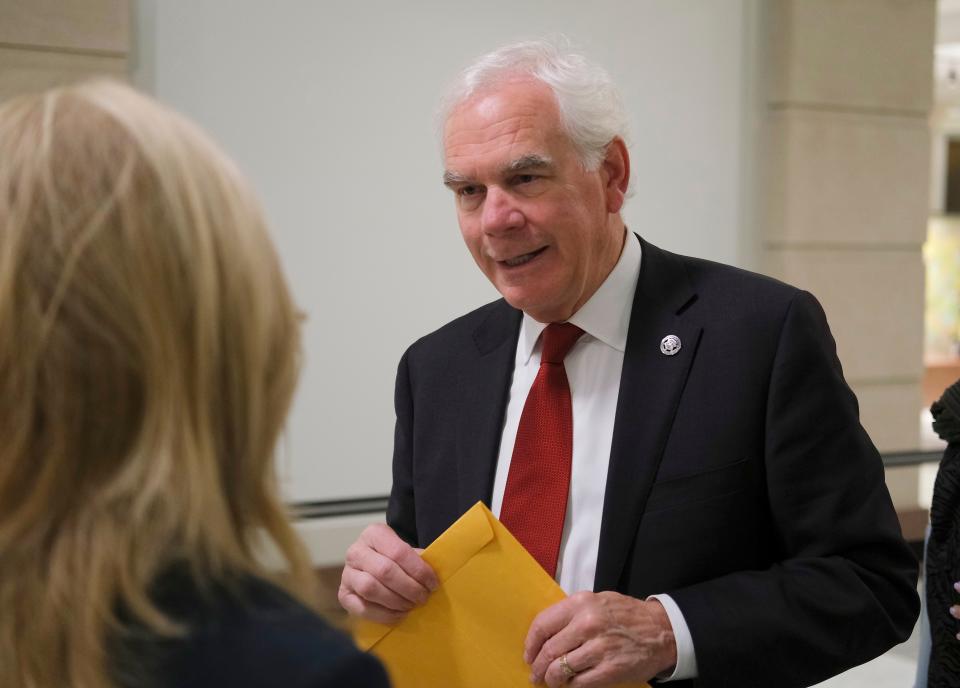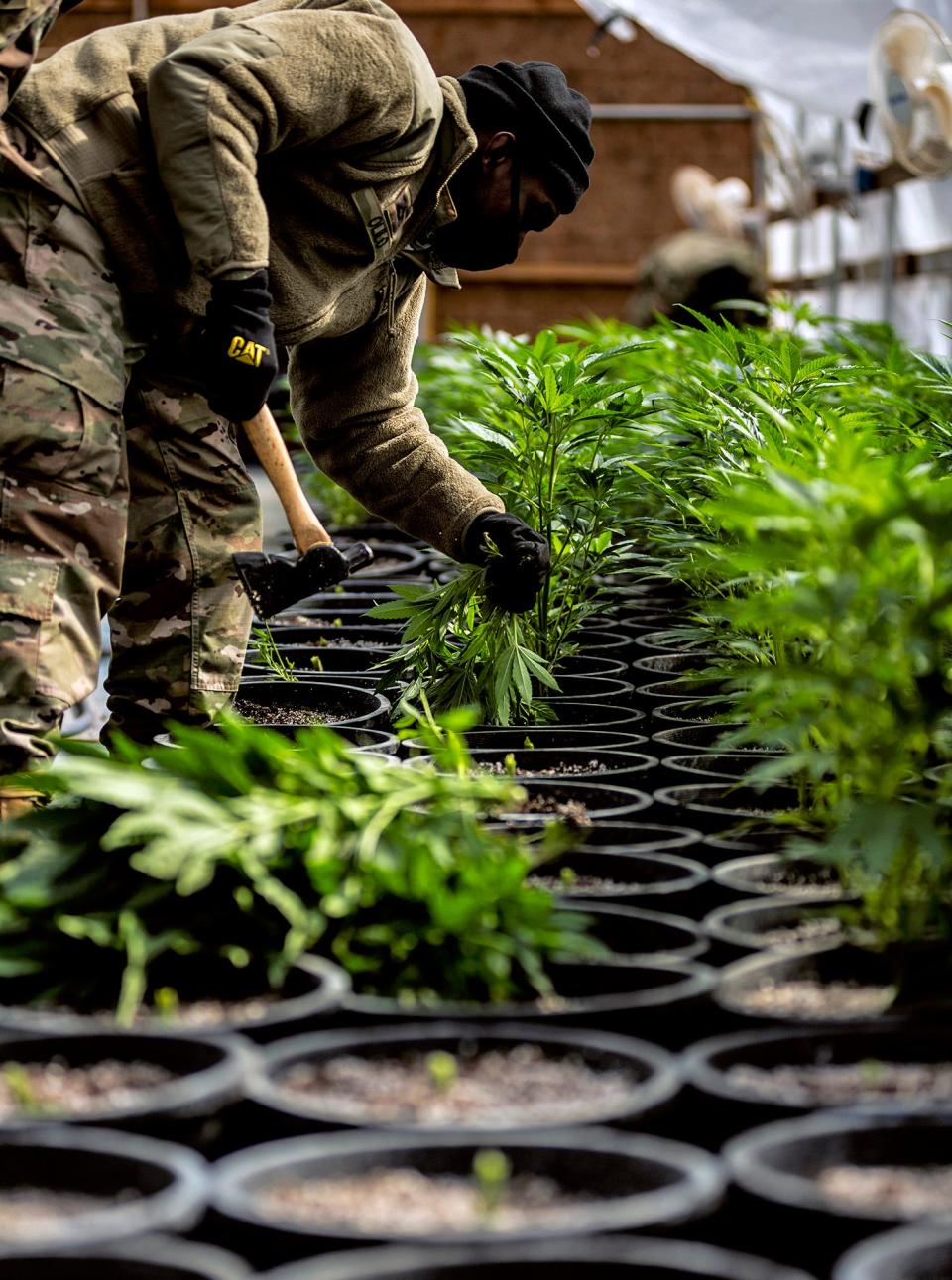How rural Oklahomans and marijuana could decide attorney general's race
Men in boots, cowboy hats and shiny belt buckles stood in a circle outside the nation’s largest cattle pen, surrounding the only man in the group wearing a suit and tie — Oklahoma Attorney General John O’Connor.
“Farmers and ranchers have been the backbone of our state, and remain an incredibly powerful voice for force in our state and in our culture,” said O’Connor, who had just announced endorsements from some of the state’s largest agriculture organizations, which had representatives present for the announcement last week at the Oklahoma National Stockyards in Oklahoma City.
For an incumbent who is trailing in the polls just a few weeks before the Republican primary, the endorsements meant a possible boost of support in rural Oklahoma, along with the likelihood of thousands of dollars in political contributions.
More: Gov. Stitt signs law preventing new medical marijuana businesses from getting licenses

But Gentner Drummond, O’Connor’s challenger, has the manure-caked boots he believes say more than endorsements from a few Oklahoma City-based organizations ever will.
Drummond is a lawyer and works in finance, but his family also owns a large cattle ranch, where he still works a few days a week.
His campaign credits those ranching roots for his strong performance in rural Oklahoma when he ran for attorney general four years ago. Drummond lost a runoff race by fewer than 300 votes, but he carried most of the state’s rural counties.
Rural vote important in Oklahoma's race for attorney general
Both O'Connor and Drummond are from Tulsa, which could split its vote.
“My guess is rural Oklahoma will make the decision on who the next attorney general is,” said Rodd Moesel, president of the Oklahoma Farm Bureau, which is supporting O’Connor.
While not a creator of agriculture policy, the attorney general’s office makes enforcement decisions related to farming operations, including conservation and water rights.
But this year, the biggest issue for the state’s agriculture community might be the spread of marijuana growing operations, which have not always been a welcome neighbor for traditional farms.
More: Marijuana products recalled in Oklahoma after samples found with salmonella, E. coli
Both candidates say they will be tough on illegal marijuana growth operations, especially those backed by foreign individuals or companies.
"I hear from farmers and ranchers all across rural Oklahoma about how various foreign entities skirt the laws to control land in Oklahoma,” Drummond told The Oklahoman. “It is a violation of our state Constitution. This is a risk to our economic security and well-being, and we deserve an attorney general who will fight back to protect our land.”
Oklahoma statute prohibits a foreign company from owning or leasing agricultural land but courts have granted numerous exceptions over the years, including the ability of a foreign company to establish a U.S.-based corporation.
“It's not an easy thing to investigate and do because there's, you know, shell companies and different ways to hide that ownership out there,” said Scott Blubaugh, president of American Farmers & Ranchers, which has endorsed O'Connor. “It really takes a commitment from law enforcement and the attorney general to dig deep."
Growth in foreign-held agriculture land
Oklahoma has had some of the largest growth in foreign-held agricultural land in recent years, according to a report from the U.S. Department of Agriculture.
While some of that growth is tied to marijuana grow operations, it includes other agriculture sectors.
A recent report from the U.S.-China Economic and Security Review Commission highlighted the significant growth in Chinese-owned agriculture operations in the United States, saying the U.S. had become a “target” of China in its quest to strengthen its agriculture sector and food security.
In 2013, a Chinese company, with help from its government, purchased Smithfield Foods Inc. Over the last several years, Chinese companies have significantly increased their land holdings in the United States, increasing from 13,720 acres in 2010 to more than 350,000 acres in 2020, according to Agricultural Foreign Investment Disclosure reports from the U.S. Department of Agriculture.
Asked about foreign-owned agriculture, O'Connor acknowledged it presented a challenge for Oklahomans.
More: Oklahoma's marijuana regulator is undergoing its biggest change yet

But he specifically mentioned a desire to go after illegal marijuana operations.
"The illegal ownership sometimes is inflating land prices," O'Connor said. "So farmers who waited for generations to have an opportunity to buy the land next door are being (beat out) by out-of-country buyers who are paying exorbitant prices."
Oklahoma state government reporting is supported in part by a grant from the Kirkpatrick Foundation. To support work like this, consider purchasing a digital subscription to the Oklahoman today.
This article originally appeared on Oklahoman: Oklahoma AG candidates plan to act on 'foreign-owned' marijuana farms

